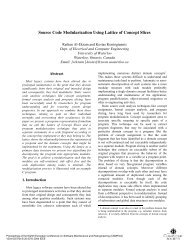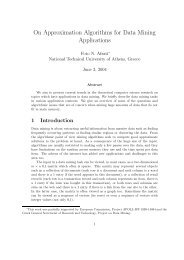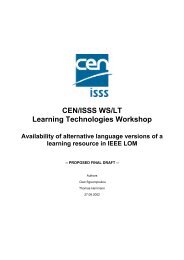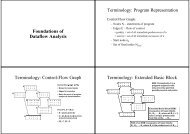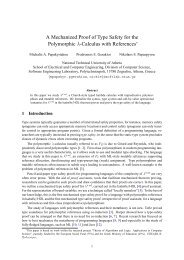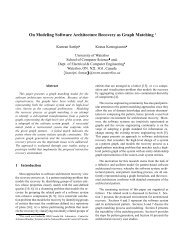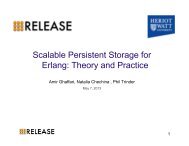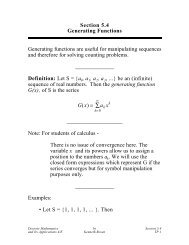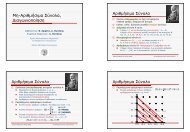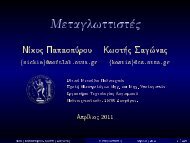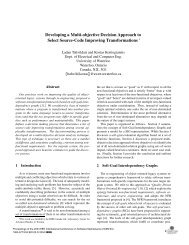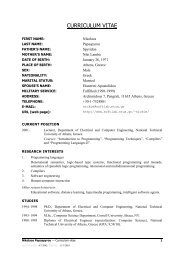Manual
Manual
Manual
Create successful ePaper yourself
Turn your PDF publications into a flip-book with our unique Google optimized e-Paper software.
Chapter 10: C++ Language Interface 103<br />
10.1.4 C++ Parser Interface<br />
The output files ‘output.hh’ and ‘output.cc’ declare and define the parser class in the<br />
namespace yy. The class name defaults to parser, but may be changed using ‘%define<br />
"parser_class_name" "name"’. The interface of this class is detailed below. It can be<br />
extended using the %parse-param feature: its semantics is slightly changed since it describes<br />
an additional member of the parser class, and an additional argument for its constructor.<br />
semantic_value_type<br />
location_value_type<br />
The types for semantics value and locations.<br />
[Type of parser]<br />
[Type of parser]<br />
parser (type1 arg1, ...)<br />
[Method on parser]<br />
Build a new parser object. There are no arguments by default, unless ‘%parse-param<br />
{type1 arg1}’ was used.<br />
int parse ()<br />
[Method on parser]<br />
Run the syntactic analysis, and return 0 on success, 1 otherwise.<br />
std::ostream& debug_stream ()<br />
[Method on parser]<br />
void set_debug_stream (std::ostream& o )<br />
[Method on parser]<br />
Get or set the stream used for tracing the parsing. It defaults to std::cerr.<br />
debug_level_type debug_level ()<br />
[Method on parser]<br />
void set_debug_level (debug level l )<br />
[Method on parser]<br />
Get or set the tracing level. Currently its value is either 0, no trace, or nonzero, full<br />
tracing.<br />
void error (const location type& l, const std::string& m ) [Method on parser]<br />
The definition for this member function must be supplied by the user: the parser uses<br />
it to report a parser error occurring at l, described by m.<br />
10.1.5 C++ Scanner Interface<br />
The parser invokes the scanner by calling yylex. Contrary to C parsers, C++ parsers are<br />
always pure: there is no point in using the %pure-parser directive. Therefore the interface<br />
is as follows.<br />
int yylex (semantic value type& yylval, location type& [Method on parser]<br />
yylloc, type1 arg1, ...)<br />
Return the next token. Its type is the return value, its semantic value and location<br />
being yylval and yylloc. Invocations of ‘%lex-param {type1 arg1}’ yield additional<br />
arguments.<br />
10.2 A Complete C++ Example<br />
This section demonstrates the use of a C++ parser with a simple but complete example.<br />
This example should be available on your system, ready to compile, in the directory ../bison/examples/calc++.<br />
It focuses on the use of Bison, therefore the design of the various<br />
C++ classes is very naive: no accessors, no encapsulation of members etc. We will use a<br />
Lex scanner, and more precisely, a Flex scanner, to demonstrate the various interaction. A<br />
hand written scanner is actually easier to interface with.



